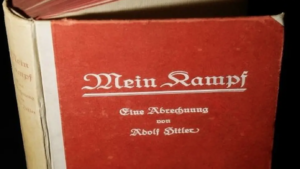The principal method through which Hitler sought to reestablish control over the party was through ideological purity and coherence. He did this the hard way, seeking to achieve uniformity across a range of highly contentious issues. Hitler could not simply impose his views: he had to cajole and persuade. This was done through speeches, declarations, debates and, from the end of 1925, through the publication in succession of the two volumes of Mein Kampf. These were only partly written from scratch at Landsberg and after his release, the rest being cobbled together from various articles and instructions, and even from drafts dating back to before the Putsch. Much of Mein Kampf originated as a direct response to the political events of 1925-6, and Hitler used the text to lay down the law, at least implicitly, not just to the membership but also to his internal critics. For this reason the book needs to be seen in the context of the many contemporaneous statements he made before and after publication…
Much of what Hitler said in Mein Kampf and his various speeches rehearsed familiar themes from the time before the Putsch. There was the same focus on the forces of domestic fragmentation. Hitler inveighed once more against the ‘mendacity of these so-called federalist circles’ who were only promoting their ‘dirty’ party interest. He continued to fulminate about the disintegrative effect of Marxism, and to lament the alienation of German workers. Hitler rose to new heights of invective against the German middle class, whom he dismissed as ‘philistines’, ‘bourgeois boobies’, who were so befuddled by the ‘fug of associational meetings’ that they were unable to transcend the ‘usual jingoism of our bourgeois world of today’. He contrasted the robustness of the SA, who knew that ‘terror can only be broken by terror’, with ‘bourgeois wimpishness’. Hitler also trenchantly restated his objections to parliamentarism and electoral politics, and western democracy in general, concluding that the ‘majority principle’ amounted to ‘the demolition of the Führer idea as such’.
______ 卐 ______
Editor’s note: In the American racial right I have never seen a critical attitude to democracy, which we could define as the secular religion of the ‘divine right of the people’. Nor do we know a critique of the bourgeoisie. Fortunately, today’s progressive religion is so delusional that even the rich of Pacific Palisades in California are, at this very hour, being punished by the loss of their mansions. The time will come when the whole American nation will go up in flames, when its precious dollar will collapse (a crisis that, fortunately, will also affect the rest of the degenerate, Mammon-worshipping West)…
______ 卐 ______
The main danger of Germany’s internal weakness was that it made her vulnerable to external attack, especially from the enemies that Hitler feared most: international capitalism, Anglo-America and the associated forces of world Jewry. Hitler critiqued the economics of inequality and exploitation, the ‘jarring juxtaposition of poor and rich so close to each other’, the ‘role of money’, in which ‘money [became] God’ and ‘the false God of Mammon was offered incense’. He became increasingly convinced that ‘the heaviest battle to be fought was no longer against enemy peoples but against international capital’. Here Hitler insisted more than ever on his earlier distinction between national capital, which the state could control, and pernicious international capital, which controlled states or sought to do so. One of its principal instruments of subjugation was revolutionary Marxism, which undermined national economies, societies and governments. Others were economic immiseration and racial contamination, both of which also reduced the capacity of nations to resist international takeover. For Hitler, maintaining an independent national economy was therefore absolutely central to the defence of national identity, sovereignty and racial purity. Hitler violently objected to international capitalism even when it was not Jewish, but he assigned the Jews a particularly malevolent role within the global capitalist system; this remained the principal root of his antisemitism. In Mein Kampf, as in his earlier rhetoric, Jews were inseparably linked with money and the whole capitalist system as ‘traders’, as ‘middlemen’, who levied an ‘extortionate rate of interest’ for their ‘financial deals’. Jewry, he claimed, aimed at nothing less that the ‘financial domination of the entire economy’. Yet because ‘a Bolshevized world can only survive if it encompasses everything’, a ‘single independent state’—such as a revived Germany—could bring the whole juggernaut to a standstill…
Hitler returned to this theme in Mein Kampf, when he said that ‘for purely emotional reasons one should not show the masses two or more enemies, because this would otherwise lead to a complete fragmentation of their striking power’…
Hitler’s rhetoric was thus far more anti-capitalist than anti-communist: references to Dawes in his speeches dwarfed those to Lenin at this time. He continued to fear Bolshevism, not in the form of the Red Army, but principally as a virus which would render Germany ripe for takeover by the forces of international capitalism.
Worse still, Hitler claimed, international capitalism sought to destroy the German bloodline by ‘contamination through Negro blood on the Rhine’ (an allusion to colonial soldiers in the French forces of occupation) in order to ‘begin the bastardization of the European continent from its central point’. Contamination of the blood, he warned, could only be removed in the course of ‘centuries, if at all’. In this narrative, German mass emigration took on a particular importance. Hitler saw it as part of a concerted plan to destroy the biological substance of German people going back centuries. ‘The German people had to send out their sons,’ Hitler lamented, with the result that for some three hundred years, Germans had served as ‘beasts of burden for other nations’ and had moved to ‘Australia, Central America and South America’. He would return to this theme over and over in the years to come.
